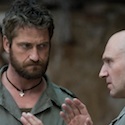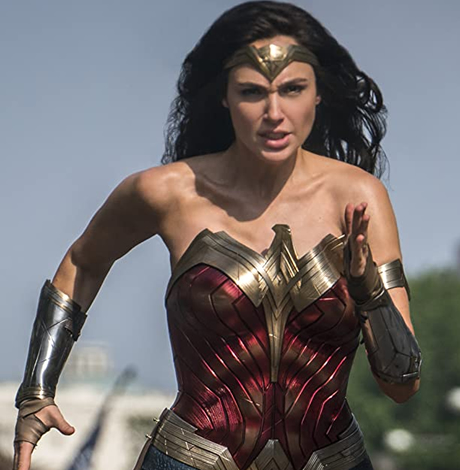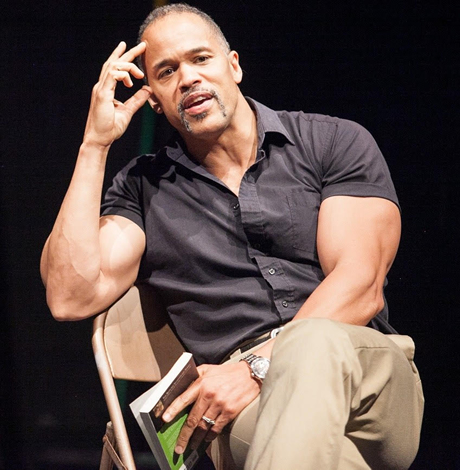Arts & Entertainment
Fiennes’ fine film
Actor-turned-director gives bold, homoerotic spin on Shakespeare classic

The final image in Ralph Fiennes’ fine adaptation of Shakespeare’s “Coriolanus” is riveting — two men in a war-torn landscape locked in a deadly embrace. Their final coupling sums up the passionate love-hate relationship and the series of personal and political betrayals that have led them to this fatal climax.
One of the men is the Roman general Caius Martius (played by director Fiennes) and the other is his sworn enemy, the Volscian leader Tullus Aufidius (played with brooding intensity by Gerard Butler, probably best known to gay audiences as the title character in the movie version of “The Phantom of the Opera” and the buff, scantily clad Spartan general in “300.”) When the movie opens, Martius is at the top of his game. He brutally but effectively suppresses an uprising by the starving plebians and almost single-handedly halts an attack on Rome by the Volscian army. (He is given the honorific Coriolanus to mark his conquest of the Volscian city of Corioles.) The tables turn, however, when his mother and their well-meaning patrician friends try to push the warrior into a political career. The skills that serve him so well on the battlefield (rage, invective, decisive action, foolhardy risk-taking) fail him in the public sphere. The fallen war hero is banished from Rome and joins forces with his former Volscian enemies.
Screenwriter John Logan (Gladiator) does an excellent job of streamlining and updating Shakespeare’s timeless and timely tale. He and Fiennes present the story in a modern-day setting yet retain the richness of Shakespeare’s language, story and characters. The text is tidily trimmed throughout, but the only major excision is the famous fable of the belly, a charming parable used to keep the lower classes in check. Several expository scenes and messenger speeches are transferred with great facility to television anchors and pundits (on the wittily named Fideles TV). Battle scenes were shot in Belgrade and most of the secondary roles are filled by Serbian actors. Cinematographer Barry Atkinson (who worked with Fiennes on the award-winning The Hurt Locker) captures the noise, rage, terror and brutality of contemporary warfare in horribly effective detail. The savage intensity of the battle scenes contrasts nicely with the suave treachery of the political scenes.
Fiennes and Logan also follow Shakespeare in highlighting the homosocial bonds between the politicians and the soldiers and the explicitly homoerotic nature of the relationship between Coriolanus and Aufidius. Soldiers routinely greet each other by declaring they are happier to see their returning colleagues than they ever were to see their wives. Politicians taunt each other with charges of feminine or boyish behavior. Aufidius declares that Coriolanus is his enemy, yet welcomes him gladly to the Volscian camp. Under Fiennes’ assured direction, the two men literally cannot keep their hands off each other, yet they cannot stop battling for dominance. Their smoldering glances burn up the screen and their scary fight scenes only stop when one of the participants loses consciousness.
Fiennes’ focus on the homosocial and misogynistic world of the battlefield and the halls of power (in this case, smoke-filled bars, marble hearing rooms and brightly lit television studios) give a clear context for Vanessa Redgrave’s chilling performance of Coriolanus’ monstrous mother Volumnia, clearly one of the most intelligent people in this Rome, but there she has no effective outlet for her brains or passion. Instead of participating in the great events at the Capitol, she is forced to watch them unfold on TV. Her thwarted ambition is poured into her son, an inadequate vessel for her grand dreams, and the result is tragedy. Redgrave shines in every scene, whether chastising her daughter-in-law for her fears, tenderly dressing her son’s wounds, attacking the opposition or pleading with her son to return to Rome. The picture of Redgrave as Volumnia giddily applauding her warrior son while wearing the same junior military uniform as her young grandson is an unforgettable image of the societal price of sexism.
The rest of the cast is also uniformly strong. Brian Cox (Menenius) and John Kani (Cominius) give nuanced performances as leaders of the patrician party and they are well matched by the oily Tribunes of the People, James Nesbitt (Sicinius) and Paul Jesson (Brutus). Newcomer Jessica Chastain (“The Help”), one of the breakout performers of 2011, makes a surprisingly vivid impression as Coriolanus’ wife Virgilia, who he describes as “my gracious silence.”
For many years, “Coriolanus” was rarely produced, although there has been a resurgence of interest in the play in recent years. Shakespeare’s tricky political tale is very well-served by first-time director Ralph Fiennes (who has played the role onstage). He deserves extra credit for highlighting the homoerotic undertones that many directors shy away from, especially since the end result is a nuanced and fascinating portrayal of thwarted ambition, military bravado and political treachery. This is not a warm and fuzzy film, but it is a compelling and important one.
Theater
‘Amm(i)gone’ explores family, queerness, and faith
A ‘fully autobiographical’ work from out artist Adil Mansoor

‘Amm(i)gone’
Thorough May 12
Woolly Mammoth Theatre
641 D St., N.W.
$60-$70
Woollymammoth.net
“Fully and utterly autobiographical.” That’s how Adil Mansoor describes “Amm(i)gone,” his one-man work currently playing at Woolly Mammoth Theatre.
Both created and performed by out artist Mansoor, it’s his story about inviting his Pakistani mother to translate Sophocles’s Greek tragedy “Antigone” into Urdu. Throughout the journey, there’s an exploration of family, queerness, and faith,as well as references to teachings from the Quran, and audio conversations with his Muslim mother.
Mansoor, 38, grew up in the suburbs of Chicago and is now based in Pittsburgh where he’s a busy theater maker. He’s also the founding member of Pittsburgh’s Hatch Arts Collective and the former artistic director of Dreams of Hope, an LGBTQ youth arts organization.
WASHINGTON BLADE: What spurred you to create “Amm(i)gone”?
ADIL MANSOOR: I was reading a translation of “Antigone” a few years back and found myself emotionally overwhelmed. A Theban princess buries her brother knowing it will cost her, her own life. It’s about a person for whom all aspirations are in the afterlife. And what does that do to the living when all of your hopes and dreams have to be reserved for the afterlife?
I found grant funding to pay my mom to do the translation. I wanted to engage in learning. I wanted to share theater but especially this ancient tragedy. My mother appreciated the characters were struggling between loving one another and their beliefs.
BLADE: Are you more director than actor?
MANSOOR: I’m primarily a director with an MFA in directing from Carnegie Mellon. I wrote, directed, and performed in this show, and had been working on it for four years. I’ve done different versions including Zoom. Woolly’s is a new production with the same team who’ve been involved since the beginning.
I love solo performance. I’ve produced and now teach solo performance and believe in its power. And I definitely lean toward “performance” and I haven’t “acted” since I was in college. I feel good on stage. I was a tour guide and do a lot of public speaking. I enjoy the attention.
BLADE: Describe your mom.
MANSOOR: My mom is a wonderfully devout Muslim, single mother, social worker who discovered my queerness on Google. And she prays for me.
She and I are similar, the way we look at things, the way we laugh. But different too. And those are among the questions I ask in this show. Our relationship is both beautiful and complicated.
BLADE: So, you weren’t exactly hiding your sexuality?
MANSOOR: In my mid-20s, I took time to talk with friends about our being queer with relation to our careers. My sexuality is essential to the work. As the artistic director at Dreams of Hope, part of the work was to model what it means to be public. If I’m in a room with queer and trans teenagers, part of what I’m doing is modeling queer adulthood. The way they see me in the world is part of what I’m putting out there. And I want that to be expansive and full.
So much of my work involves fundraising and being a face in schools. Being out is about making safe space for queer young folks.
BLADE: Have you encountered much Islamophobia?
MANSOOR: When 9/11 happened, I was a sophomore in high school, so yes. I faced a lot then and now. I’ve been egged on the street in the last four months. I see it in the classroom. It shows up in all sorts of ways.
BLADE: What prompted you to lead your creative life in Pittsburgh?
MANSOOR: I’ve been here for 14 years. I breathe with ease in Pittsburgh. The hills and the valleys and the rust of the city do something to me. It’s beautiful, it’ affordable, and there is support for local artists. There’s a lot of opportunity.
Still, the plan was to move to New York in September of 2020 but that was cancelled. Then the pandemic showed me that I could live in Pittsburgh and still have a nationally viable career.
BLADE: What are you trying to achieve with “Amm(i)gone”?
MANSOOR: What I’m sharing in the show is so very specific but I hear people from other backgrounds say I totally see my mom in that. My partner is Catholic and we share so much in relation to this.
I hope the work is embracing the fullness of queerness and how means so many things. And I hope the show makes audiences want to call their parents or squeeze their partners.
Out & About
The Rare Book Fair is coming to D.C.
Over 35 antiquarian booksellers from across the country to attend

The Capital Rare Book Fair will bring more than 35 antiquarian booksellers from across the country to D.C. from Friday, May 3 to Sunday, May 5 at the historic University Club at 1135 16th St., N.W.
This year, the fair will take over two floors in the illustrious mansion on 16th Street and showcase thousands of beautiful, notable, and rare books, maps, and historic documents from around the globe. Exceptional examples that will be offered include leaf 27 of a 40-leaf xylographic Biblia pauperum, a picture Bible from 1465 for $85,000 from Bruce McKittrick Rare Books, among many other intriguing selections.
Tickets are $50 and more information is available on the event’s website.

Friday, April 19
Center Aging Friday Tea Time will be at 2 p.m. on Zoom. This is a social hour for older LGBTQ adults. Guests are encouraged to bring a beverage of choice. For more information, email [email protected].
Go Gay DC will host “Drag Pageant” at 8 p.m. at Freddie’s Beach Bar and Restaurant. Net proceeds from this event will benefit EQUALITY NoVa, the local nonprofit organization dedicated to advancing equality in Northern Virginia. Attendance is free and more details are available on Eventbrite.
Saturday, April 20
LGBTQ People of Color Support Group will be at 1 p.m. on Zoom. This peer support group is an outlet for LGBTQ People of Color to come together and talk about anything affecting them in a space that strives to be safe and judgment free. For more details, visit thedccenter.org/poc or facebook.com/centerpoc.
Go Gay DC will host “LGBTQ+ Brunch” at 11 a.m. at Freddie’s Beach Bar & Restaurant. This fun weekly event brings the DMV area LGBTQ community, including allies, together for delicious food and conversation. Attendance is free and more details are available on Eventbrite.
Sunday, April 21
Go Gay DC will host “LGBTQ+ Dinner” at 7 p.m. at Federico Ristorante Italiano. Attendance is free and more details are available on Eventbrite.
AfroCode DC will be at 4 p.m. at Decades DC. This event will be an experience of non-stop music, dancing, and good vibes and a crossover of genres and a fusion of cultures. Tickets cost $40 and can be purchased on Eventbrite.
Monday, April 22
Center Aging: Monday Coffee & Conversation will be at 10 a.m. on Zoom. This is a social hour for older LGBTQ adults. Guests are encouraged to bring a beverage of their choice. For more details, email [email protected].
Tuesday, April 23
Pride on the Patio Events will host “LGBTQ Social Mixer” at 5:30 p.m. at Showroom. Dress is casual, fancy, or comfortable. Guests are encouraged to bring their most authentic self to chat, laugh, and get a little crazy. Admission is free and more details are on Eventbrite.
Genderqueer DC will be at 7 p.m. on Zoom. This is a support group for people who identify outside of the gender binary. Whether you’re bigender, agender, genderfluid, or just know that you’re not 100% cis. For more details, visit genderqueerdc.org or Facebook.
Wednesday, April 24
Job Club will be at 6 p.m. on Zoom. This is a weekly job support program to help job entrants and seekers, including the long-term unemployed, improve self-confidence, motivation, resilience and productivity for effective job searches and networking — allowing participants to move away from being merely “applicants” toward being “candidates.” For more information, email [email protected] or visit [email protected].
Asexual and Aromantic Group will be at 7 p.m. on Zoom. This is a space where people who are questioning this aspect of their identity or those who identify as asexual and/or aromantic can come together, share stories and experiences, and discuss various topics. For more details, email [email protected].
Thursday, April 25
The DC Center’s Fresh Produce Program will be held all day at the DC Center for the LGBT Community. People will be informed on Wednesday at 5:00 pm if they are picked to receive a produce box. No proof of residency or income is required. For more information, email [email protected] or call 202-682-2245.
Virtual Yoga with Charles M. will be at 7 p.m. on Zoom. This is a free weekly class focusing on yoga, breath work, and meditation. For more details, visit the DC Center for the LGBT Community’s website.
-

 District of Columbia2 days ago
District of Columbia2 days agoReenactment of first gay rights picket at White House draws interest of tourists
-

 District of Columbia2 days ago
District of Columbia2 days agoNew D.C. LGBTQ+ bar Crush set to open April 19
-

 Arizona2 days ago
Arizona2 days agoAriz. governor vetoes anti-transgender, Ten Commandments bill
-

 Africa4 days ago
Africa4 days agoUgandan activists appeal ruling that upheld Anti-Homosexuality Act










